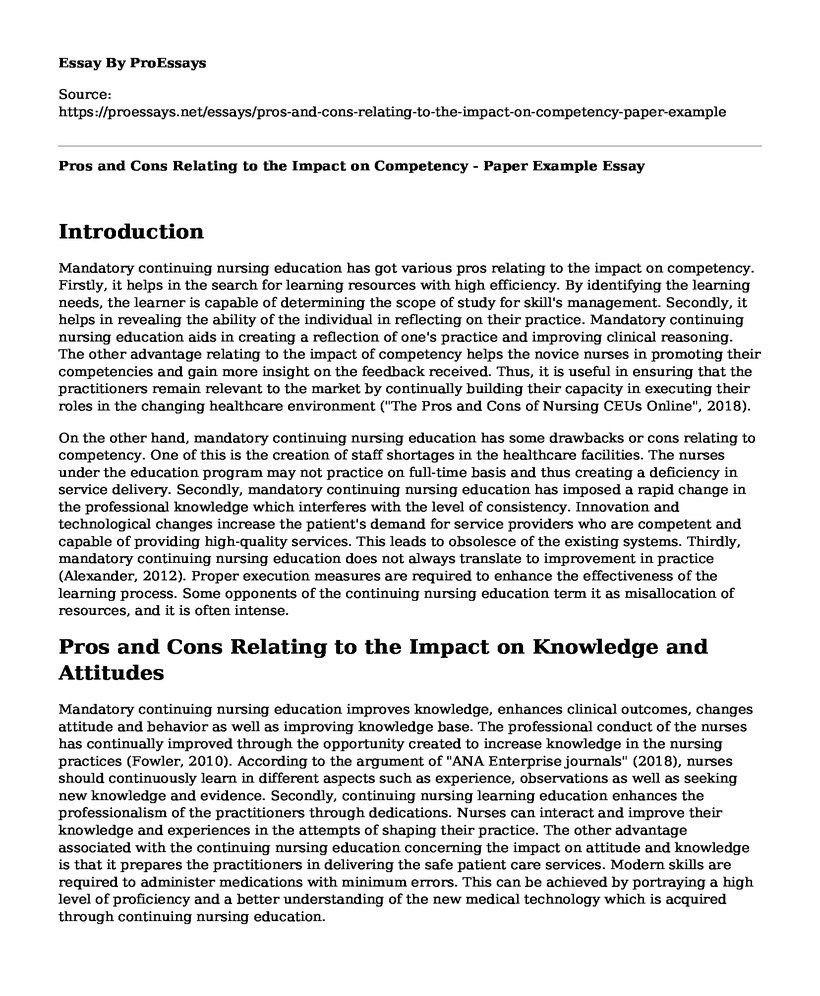Introduction
Mandatory continuing nursing education has got various pros relating to the impact on competency. Firstly, it helps in the search for learning resources with high efficiency. By identifying the learning needs, the learner is capable of determining the scope of study for skill's management. Secondly, it helps in revealing the ability of the individual in reflecting on their practice. Mandatory continuing nursing education aids in creating a reflection of one's practice and improving clinical reasoning. The other advantage relating to the impact of competency helps the novice nurses in promoting their competencies and gain more insight on the feedback received. Thus, it is useful in ensuring that the practitioners remain relevant to the market by continually building their capacity in executing their roles in the changing healthcare environment ("The Pros and Cons of Nursing CEUs Online", 2018).
On the other hand, mandatory continuing nursing education has some drawbacks or cons relating to competency. One of this is the creation of staff shortages in the healthcare facilities. The nurses under the education program may not practice on full-time basis and thus creating a deficiency in service delivery. Secondly, mandatory continuing nursing education has imposed a rapid change in the professional knowledge which interferes with the level of consistency. Innovation and technological changes increase the patient's demand for service providers who are competent and capable of providing high-quality services. This leads to obsolesce of the existing systems. Thirdly, mandatory continuing nursing education does not always translate to improvement in practice (Alexander, 2012). Proper execution measures are required to enhance the effectiveness of the learning process. Some opponents of the continuing nursing education term it as misallocation of resources, and it is often intense.
Pros and Cons Relating to the Impact on Knowledge and Attitudes
Mandatory continuing nursing education improves knowledge, enhances clinical outcomes, changes attitude and behavior as well as improving knowledge base. The professional conduct of the nurses has continually improved through the opportunity created to increase knowledge in the nursing practices (Fowler, 2010). According to the argument of "ANA Enterprise journals" (2018), nurses should continuously learn in different aspects such as experience, observations as well as seeking new knowledge and evidence. Secondly, continuing nursing learning education enhances the professionalism of the practitioners through dedications. Nurses can interact and improve their knowledge and experiences in the attempts of shaping their practice. The other advantage associated with the continuing nursing education concerning the impact on attitude and knowledge is that it prepares the practitioners in delivering the safe patient care services. Modern skills are required to administer medications with minimum errors. This can be achieved by portraying a high level of proficiency and a better understanding of the new medical technology which is acquired through continuing nursing education.
On the other hand, there are various cons in the learning education relating to knowledge and attitude. Firstly, the program has faced criticism for the high costs involved. For instance, it is expensive to cater for the nursing seminars and workshops or even subscribing to relevant journals to advance their knowledge. Also, it involves the adoption of vast changing innovation and technology which might be costly to afford. Without a doubt, the cost is a confounding element in the mandatory continuing nursing education (Fowler, 2010). Secondly, the program is time-consuming for the successful implementation of change. Nurses spend much of their time away from the patients and this may lower the quality of the patient care provided.
References
Alexander, M. (2012). Does Mandatory Continuing Education Ensure Continuing Competence? Journal of Nursing Regulation, 3(2), 3-5. doi: 10.1016/s2155-8256(15)30211-8
ANA Enterprise journals. (2018). Retrieved from https://www.nursingworld.org/membership/ana-periodicals/
Fowler, M. (2010). Guide to the code of ethics for nurses with interpretive statements. Silver Spring, MD: American Nurses Association.
The Pros and Cons of Nursing CEUs Online. (2018). Retrieved from http://www.whyiwanttobeanurse.org/continuing-education-units/The-Pros-And-Cons-of-
Cite this page
Pros and Cons Relating to the Impact on Competency - Paper Example. (2022, Jul 21). Retrieved from https://proessays.net/essays/pros-and-cons-relating-to-the-impact-on-competency-paper-example
If you are the original author of this essay and no longer wish to have it published on the ProEssays website, please click below to request its removal:
- Diagnostic Tests for Sore Throats
- Film Analysis Essay on Still Alice: The Theme of Alzheimer's Disorder
- Spiritual Care and Worldviews in Nursing
- Paper Example on Form of Allergies
- Research Paper on Social Work: Preventing Social Exclusion & Inclusion for Deviant Behaviors
- Research Proposal on Teen Mothers' Social & Economic Experiences in Low-Income Areas
- Paper Example on Infants Drug Withdrawal: Nurses, Acuity & Parental Needs







